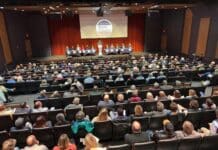Republicans and Democrats in the newly tied state House were deadlocked on Monday over a bill that proposes to place a constitutional amendment on the ballot in 2026 that would ask voters if a portion of projected future budget surpluses should be returned to state taxpayers.
If such a referendum were approved by a majority of voters, the constitutional amendment triggered by HF4 would create a tax relief account using money from a projected surplus, equal to the amount by which projected revenues exceed 105 percent of projected expenditures, as determined by the state’s November budget forecast. The legislation would not require the signature of Gov. Tim Walz.
But Democrats in the Minnesota House of Representatives don’t like the idea. Their 67 members voted in unison to sink the bill by one vote on Thursday. It was the first vote on the House floor to feature a 67-67 tie this session, and came just minutes after newly elected Rep. David Gottfried, DFL-Shoreview, was seated. A bill needs 68 votes to pass off the House floor.
“That’s the thing that gets me about this,” said Rep. Aisha Gomez, DFL-Minneapolis, who chaired the House Taxes Committee in 2023 that created a $9 billion tax bill to help pay for a nearly 40 percent increase in the state budget. “It’s that [this bill] is incredibly unfair—it picks winners and losers. And it picks as winners the exact people who do not need a hand in this economy.”
House Republican Leader Harry Niska, R-Ramsey, rejected that claim.
The proposal “would put an end to this reckless spending cycle, by proposing a constitutional amendment for the 2026 ballot, allowing Minnesotans, not politicians, to decide whether a portion of future surpluses would be returned directly to taxpayers,” Niska said.
Swing districts DFLers mostly silent during floor debate
Rep. Wayne Johnson, R-Cottage Grove, is the chief author of HF4. The first-term legislator told media on Monday he was inspired to bring the constitutional amendment proposal after having conversations with hundreds of voters while campaigning last fall—in a district that was one of the most competitive in the state.
He said the number-one issue he heard from constituents of the district was their frustration with how Gov. Tim Walz and the DFL majority in the House and Senate spent the entirety of a record $18 billion surplus instead of returning it to taxpayers. They also increased the state budget by nearly 40 percent, from $52 billion to $72 billion, in just one biennium.
“We heard a lot people out at the doors telling us, ‘We want some money back,’” Johnson said before the House put the bill to a vote on Monday. “This [bill] is us listening to the voters of Minnesota and taking action.”
Of the five House Democrats who stood on the floor to speak in opposition to the bill, four represent metro-area districts they won last fall by double digits. The one Democrat who represents a potential swing district who openly criticized the measure was Zack Stephenson, of Coon Rapids. The four-term DFLer said the bill would unwisely be “locking in” projected surpluses that may not come to fruition, depending on unforeseen circumstances.
Others, like Rep. Nathan Coulter, DFL-Bloomington, said a constitutional amendment that would guarantee some of a surplus would be returned to taxpayers would serve only as a “boost to big businesses and wealthy homeowners.”
Coulter also said that such a referendum presents a “naïve dream that enough of the scraps will fall off the table to the rest of us. This is a gimmick at best, a false hope at worst.”
But Speaker of the House Lisa Demuth, R-Cold Spring, pointed out that the constitutional amendment would give the voters of Minnesota more of a say when the government over-collects on taxes.
“When you look at over the last two years with an $18 billion surplus that was completely spent, if we would have had this provision in law there would have been at least $5 billion, if not more, available to be returned to the taxpayers,” Demuth said.
The Senate companion bill to HF4 is sponsored by Rep. Karin Housley, R-Stillwater, and three other Republicans. It hasn’t yet been given a hearing in the Senate, which Democrats control by a one-seat margin.
Demuth denied that putting the bill to a vote was an attempt to put Democrats on the record over what to do with future budget surpluses.
“I don’t look at this as a ‘gotchya’ bill,” Demuth said. “This is something we’ve heard at the doors when we talked with voters in the fall.”
Hank Long
Hank Long is a journalism and communications professional whose writing career includes coverage of the Minnesota legislature, city and county governments and the commercial real estate industry. Hank received his undergraduate degree at the University of Minnesota, where he studied journalism, and his law degree at the University of St. Thomas. The Minnesota native lives in the Twin Cities with his wife and four children. His dream is to be around when the Vikings win the Super Bowl.












